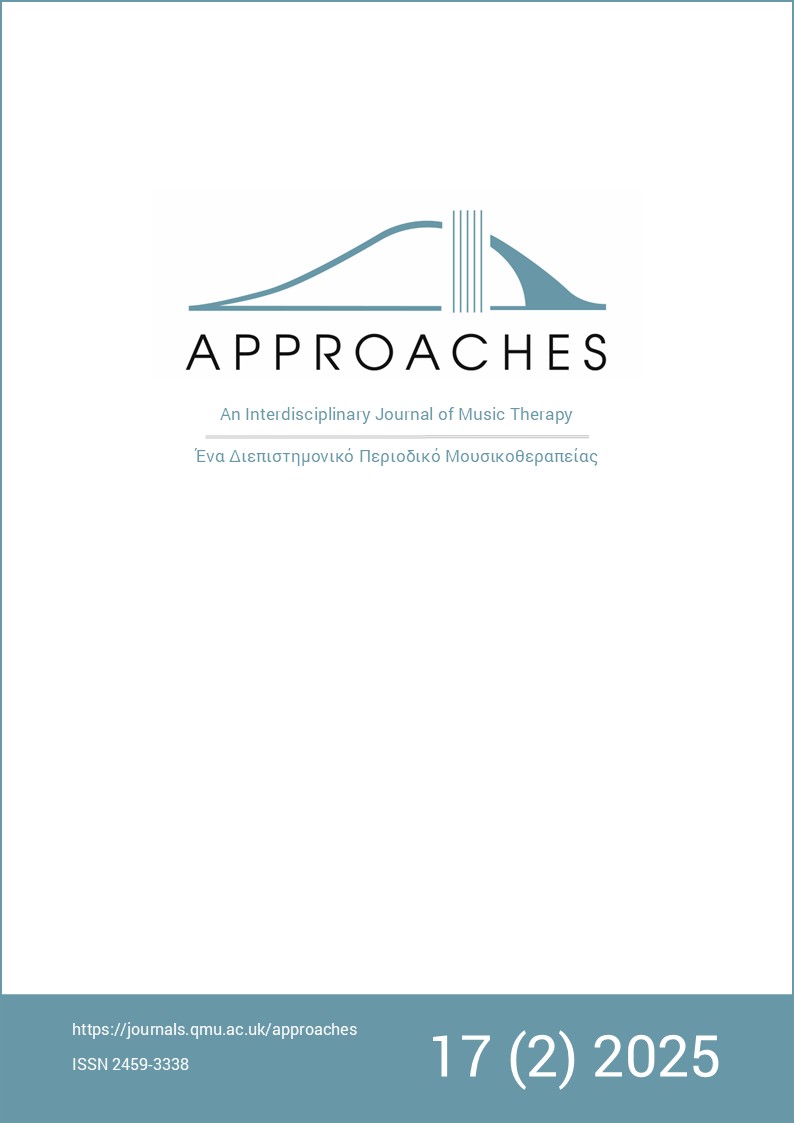Διερεύνηση δοκιμαστικής μελέτης σκοπιμότητας για την φροντίδα μουσικής σε ξενώνα ανακουφιστικής και παρηγορητικής φροντίδας
DOI:
https://doi.org/10.56883/aijmt.2024.46Λέξεις-κλειδιά:
ξενώνας ανακουφιστικής και παρηγορητικής φροντίδας (ΞΑΠΦ), φροντίδα μουσικής, ποιότητα ζωής, δοκιμαστική μελέτη σκοπιμότητας, τυχαιοποιημένη ελεγχόμενη δοκιμή (ΤΕΔ)Περίληψη
Η φύση του περιβάλλοντος ενός ξενώνα ανακουφιστικής και παρηγορητικής φροντίδας (ΞΑΠΦ) απαιτεί την υποστήριξη των συνεχώς μεταβαλλόμενων αναγκών των νοσηλευόμενων και την ανταπόκριση σε απρόβλεπτες καταστάσεις – ως εκ τούτου, αυτή η μη προβλεψιμότητα έχει ιστορικά αποτελέσει πρόκληση για τη συλλογή δεδομένων υψηλής ποιότητας σε τέτοια περιβάλλοντα. Μέσω μίας συναινετικής προσέγγισης ανατροφοδότησης, αυτή η πιλοτική μελέτη επιδιώκει να καθορίσει τη σκοπιμότητα της υλοποίησης μίας κλινικής δοκιμής με στόχο την κατανόηση του αντίκτυπου μίας προ-ηχογραφημένης παρέμβασης φροντίδας μουσικής στην ποιότητα ζωής σε περιβάλλοντα ΞΑΠΦ. Συμπεριελήφθησαν τέσσερις συμμετέχοντες με βαθμολογία ≥ 40 στην Κλίμακα Ανακουφιστικής Απόδοσης [Palliative Performance Scale, PPS]. Προσχεδιασμένα άλμπουμ μουσικής φροντίδας προορισμένα για τον ΞΑΠΦ χρησιμοποιήθηκαν ως παρέμβαση για ελάχιστη διάρκεια 30 λεπτών. Χρησιμοποιήθηκαν η Edmonton Κλίμακα Αξιολόγησης Συμπτωμάτων, ο Δείκτης Ανακουφιστικής Ποιότητας Ζωής [Hospice Quality of Life Index], και η Κλίμακα Αξιολόγησης Άγχους [State-Trait Anxiety Inventory], αντικατοπτρίζοντας το σχεδιασμό μίας τυχαιοποιημένης ελεγχόμενης δοκιμής (ΤΕΔ), αλλά δεν έγινε στατιστική ανάλυση για την ερμηνεία αυτών στην παρούσα πιλοτική μελέτη. Η συλλογή
δεδομένων συμπεριέλαβε επίσης την καταγραφή των απόψεων των συμμετεχόντων και των φροντιστών. Βάσει της ανατροφοδότησης των συμμετεχόντων, των επαγγελματιών υγείας και των ειδικών στη μουσική φροντίδα, η διάρκεια της παρέμβασης μειώθηκε σε τουλάχιστον 15 λεπτά, ενώ καταργήθηκαν τα προαπαιτούμενα κριτήρια συμμετοχής ως προς την Κλίματα Ανακουφιστικής Απόδοσης. Ο αριθμός των μέτρων έκβασης μειώθηκε από τρία σε ένα ώστε να μετριαστεί η υπερκόπωση των συμμετεχόντων. Τέλος, οι συμμετέχοντες επεσήμαναν ότι η προ-ηχογραφημένη μουσική παρέμβαση ήταν θεραπευτική,
αιτιολογώντας έτσι την ανάγκη για περαιτέρω μελέτη των μέτρων έκβασης σχετικά με την ποιότητα ζωής. Η υλοποίηση μίας δεύτερης πιλοτικής μελέτης, για την επικύρωση των αλλαγών στο σχεδιασμό του πρωτοκόλλου της ΤΕΔ, θα είναι ένα καθοριστικής σημασίας βήμα στην ερευνητική διαδικασία, αν και τα αποτελέσματα της παρούσας μελέτης μπορούν να αξιοποιηθούν από ερευνητές που διεξάγουν ΤΕΔ σε ΞΑΠΦ για την ενημέρωση βέλτιστων πρακτικών.
Λήψεις
Δημοσιευμένα
Τεύχος
Ενότητα
Άδεια
Πνευματική ιδιοκτησία (c) 2023 Arbaaz Patel, Caleb Kim, SarahRose Black, Bev Foster, Chelsea Mackinnon

Αυτή η εργασία είναι αδειοδοτημένη υπό το CC Αναφορά Δημιουργού – Μη Εμπορική Χρήση – Όχι Παράγωγα Έργα 4.0 4.0.




